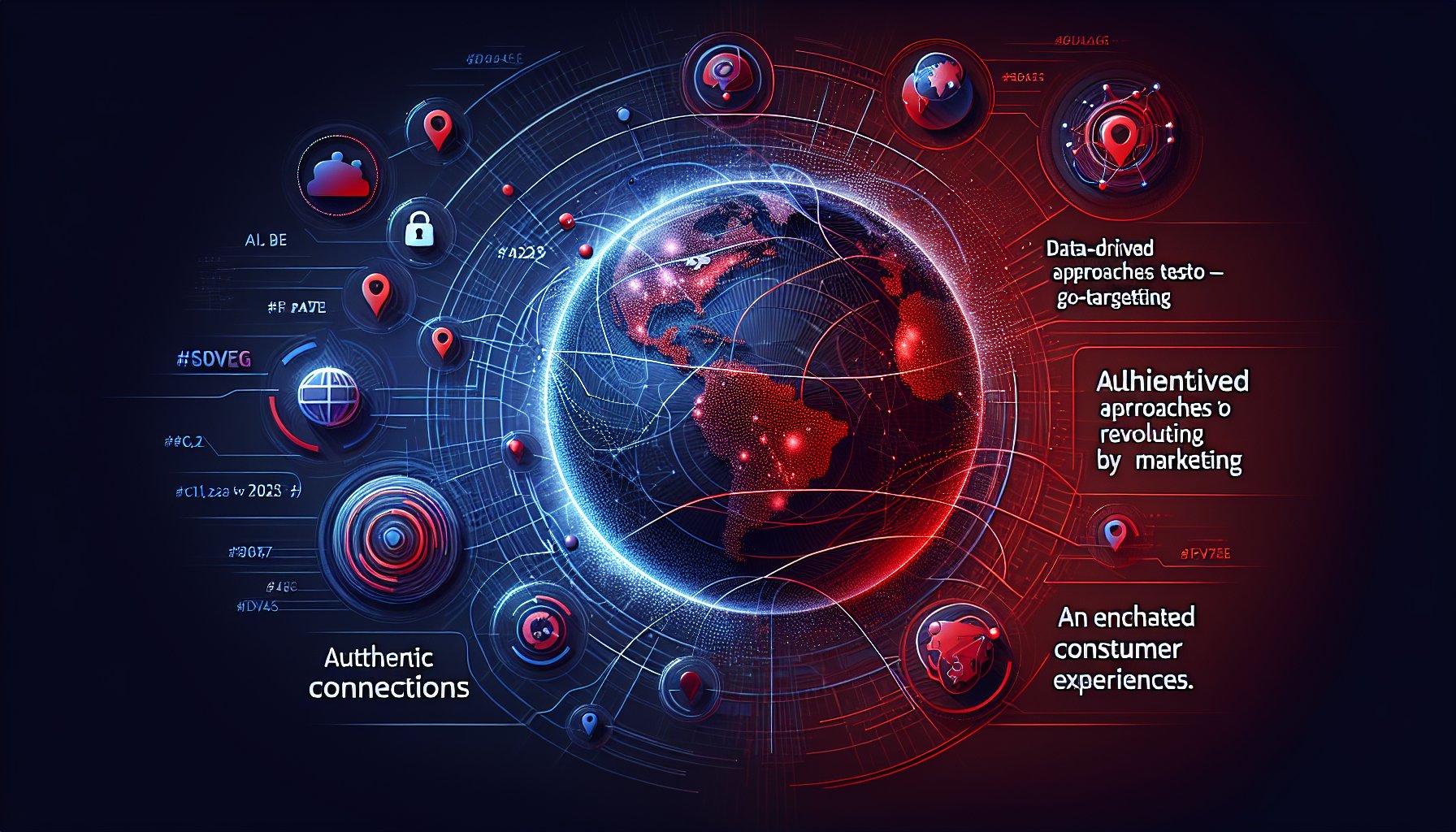Geo-Targeting Solutions
Geo-Targeting for E-Commerce: Maximizing Sales with Location-Based Strategies in 2025
Unlock the potential of geo-targeting for e-commerce in 2025. Discover how location-based strategies can enhance customer engagement, boost sales, and create meaningful connections with your audience. Embrace the future of personalized marketing today!
Nov 03, 2025
8 min read

Geo-Targeting for E-Commerce: Maximizing Sales with Location-Based Strategies in 2025
In the ever-evolving landscape of e-commerce, where competition tightens its grip and consumer expectations soar higher than your coffee-fueled imagination, mastering sophisticated marketing strategies is crucial. As we glide into 2025, geo-targeting emerges as a pivotal strategy, revolutionizing how brands connect with consumers by tailoring their messages to geographical subtleties. This strategic gem not only boosts sales but forges genuine bonds in an ever-crowded digital marketplace. In short, it's like sending your customers a love letter with a personal touch and a discount code.
The New Frontier of Retail
Welcome to the new frontier of retail, where geo-targeting reigns supreme, reimagining how brands interact with consumers in 2025. This shift isn't just a trend or a fad; it's a game plan for e-commerce businesses determined to engage and boost sales. Geo-targeting centers on delivering region-specific marketing messages, leveraging data from GPS blips, IP whispers, and local search whispers to craft experiences that truly hit home.
Picture this: A fashion retailer launches campaigns showcasing cozy winter attire for snowy regions while touting breezy summer wear for the sun-kissed tropics. It's marketing that not only sells but also whispers, "We see you, and we get you." And as businesses navigate fierce competition, from both online giants and charming boutiques, geo-targeting stands out, spotlighting a brand's visibility and relevance within its community.
Beyond the Map: Tools of the Trade
In 2025's intricate digital landscape, effective geo-targeting is like finding the perfect playlist for your life. It's about connecting personally with consumers based on their locale and embracing hyper-locality. Advanced analytics tools are the foundation of a killer geo-targeting strategy. They sift through vast data to uncover gems about consumer behavior in specific regions.
Imagine a clothing retailer discovering that coastal city dwellers love light fabrics and bright colors in summer. With this intel, they tailor campaigns that spotlight these preferences, ultimately boosting conversions and customer loyalty. Location-based advertising platforms further elevate strategies by delivering targeted ads to potential customers right in their vicinity. Think a local coffee shop sending promotional nudges to smartphones as customers stroll by, instant engagement that equals foot traffic and sales.
And let's not forget the power of localized social media campaigns and influencer collaborations. Imagine community-rooted micro-influencers crafting content that resonates with local tastes. This amplification blends authentic, community-focused messaging with technology, cultivating deeper connections and driving traffic both online and in-store.
Personalization at Scale
In the fast-paced realm of e-commerce, personalization has become the secret sauce for success. As we move into 2025, crafting customized consumer experiences through geo-targeting is key to boosting sales and loyalty. This approach lies at the intersection of data-driven insights and consumer behavior, enabling businesses to tailor offerings based on geographic contexts.
Picture a bustling street where weather dictates fashion choices. Geo-targeting allows retailers to promote weather-appropriate apparel in real-time. With data-driven insights, a fashion retailer can push notifications about warm jackets to those in a cold-weather zone while highlighting swimwear in sunny locales. This hyper-local targeting ensures marketing efforts are finely tuned to echo each community's specific needs and preferences.
This isn't just about selling stuff, it's about weaving local culture into campaigns, creating relevance and timeliness. A clothing brand promoting a festival-themed collection can localize ads to reflect neighborhoods celebrating such events. This fosters a deeper sense of community, bridging the gap between digital shopping and local engagement.
The Power of Local
In the digital commerce landscape of 2025, being "local" is not just the cherry on top, it's the whole sundae. As consumers crave personalized, relevant experiences, businesses must pivot their strategies to embrace geographical nuances. Gone are cookie-cutter campaigns; today's successful brands know that true engagement starts within the heart of the community.
Picture a boutique specializing in activewear. In a bustling urban area, they'll promote lightweight, high-intensity workout gear. Meanwhile, on the coast, they'll focus on swimwear. By leveraging geo-targeting, marketers create campaigns that speak directly to the needs of their local audience, boosting both relevance and conversion rates. This hyper-local targeting zeroes in on specific geographic areas, delivering content and promotions tailored to local preferences.
The Metrics That Matter
As we wade through the vast sea of e-commerce in 2025, it's clear that measuring geo-targeting success isn't just about sales numbers, it's about understanding the nuanced interplay between data, consumer behavior, and market dynamics. Beyond click-through rates and conversion rates, insightful metrics like customer lifetime value segmented by location offer deeper understanding.
Advanced geolocation services help brands analyze foot traffic patterns, identify peak shopping times, and understand demographic trends. This data enables hyper-local marketing strategies that create timely, relevant experiences. It's not just about immediate sales; it's about evaluating brand sentiment and community engagement. By prioritizing these insights, businesses can build deeper relationships, driving sales and fostering loyalty.
Privacy Concerns and Ethical Boundaries
In the whirlwind of e-commerce evolution, geo-targeting offers endless potential, and ethical dilemmas. As businesses harness location-based strategies, the line between effective marketing and invasive practices gets blurry. The power to tailor messages based on geographical regions has transformed engagement rates, but it raises questions about user consent and data security.
Respecting cultural sensitivities is key. In 2025, hyper-localized content must consider local demographics, social narratives, and cultural nuances. A campaign that resonates in one area might turn off consumers elsewhere. It's about personalizing offers thoughtfully, with thorough research and genuine understanding of each target market. Trust and transparency are vital, ensuring businesses not only leverage geo-targeting but do so with an ethical backbone.
Forecasting the Future
As we look ahead to 2025, geo-targeting will not just be a marketing tool, it's becoming the bedrock of brand engagement and sales strategy. Hyper-localization, powered by AI and machine learning, will define how brands interact with consumers. Businesses will tailor promotions to local events, climates, and preferences, enhancing community relations and gaining a competitive edge.
Advancements in AI will allow marketers to predict regional trends with precision. Imagine algorithms analyzing data on seasonal behaviors and social interactions, predicting which products will resonate where and when. This foresight optimizes inventory and enhances the customer experience by ensuring relevant offerings at the perfect moment.
Building a Geo-Targeting Strategy
Building a geo-targeting strategy is like assembling a finely-tuned machine, where each part must fit just right. In 2025's e-commerce landscape, geo-marketing isn't an option, it's a necessity. Understanding your customer base, who they are, where they are, and what they want, is paramount. Data on consumer demographics, preferences, and local nuances forms the foundation.
Localized content strategies follow, tailoring messages to reflect regional interests and conditions. Hyper-local advertising campaigns and influencer partnerships amplify reach, enhancing authenticity and community relevance.
Local Search Engine Optimization (SEO) is vital, ensuring businesses are both found and preferred by local consumers. Integrating mobile marketing is equally crucial, sending location-based offers to engage customers nearby. Continuous measurement and analysis of geo-targeting efforts are essential, informing agile strategies that resonate with the community.
Success Stories
In the fast-paced e-commerce arena, gotcha! Mobile Solutions showcases the power of geo-targeting to enhance engagement and sales growth. Through localized campaigns and real-time data, they've crafted community-centered experiences. By aligning messaging with local events and climate conditions, they’ve driven conversion rates and built lasting customer relationships.
Collaborating with local influencers amplifies their reach while retaining authenticity. This mix of localized content and influencer marketing fosters organic engagement, proving that understanding local contexts builds lasting relationships and drives repeat business.
A Brave New World
As we step into 2025, the synergy of AI and geo-targeting is shaping a brave new world for e-commerce. AI-driven strategies offer hyper-personalized experiences, enhancing engagement and driving sales. By predicting trends and tailoring messaging, businesses can forge lasting connections with their audience.
AI's real-time insights into consumer behavior empower businesses to create relevant, timely offers. As brands integrate into consumers' everyday lives, they're no longer just market participants, they're integral to thriving communities. By leveraging AI and geo-targeting, businesses can redefine engagement, connecting technology and humanity in a dance of modern commerce.
TL;DR
In 2025, geo-targeting is revolutionizing e-commerce by tailoring marketing strategies to geographic subtleties. Businesses that leverage location data and advanced tools create personalized experiences, boosting sales and consumer loyalty. This approach fosters genuine community connections, embracing cultural nuances while respecting privacy. As AI enhances hyper-local targeting, brands can anticipate trends, tailor offers, and redefine engagement, ensuring relevance in a competitive market. Embrace geo-targeting, it's not just a strategy, it's a blueprint for thriving in the modern, localized world of e-commerce.

Need Help?
Check out these related products that can help:










